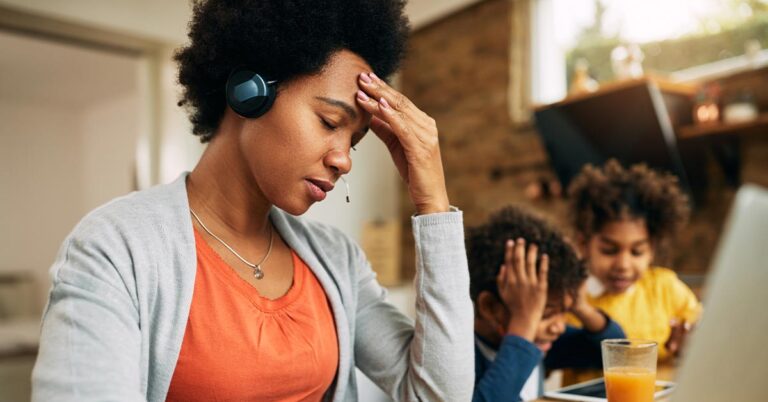WASHINGTON, DC – American women, especially younger women, find it difficult to prioritize their health.
More than six in ten (63%) U.S. women say they find this difficult to do, with majorities citing feeling overwhelmed, their mental or emotional health, caring about others before themselves, and work as their biggest barriers.
These findings are from a Hologic-Gallup Poll on Women’s Health conducted via the web among 4,001 adult women across the U.S. from April 8-16, 2024, using the probability-based Gallup Panel.
Prioritizing health is hardest for young women
Gen Z (74%), Millennial (70%) and Gen X (68%) women ages 18-59 are significantly more likely to say they find it difficult to prioritize their health than Baby Boomer (52%) and Silent Generation (39%) women.
###Embeddable###
Women who live with children under the age of 18 are much more likely than childless women to say they find it difficult to prioritize their own health. These data suggest that in addition to having limited time and resources, women who care for children prioritize the needs of their caregivers over their own health.
###Embeddable###
Among women who say they have difficulty prioritizing their health, the most commonly cited barrier is feeling too overwhelmed (72%). Additionally, more than half of women who struggle to prioritize their health cite prioritizing their mental or emotional health, caring for other family members, lack of time, or work getting in the way.
###Embeddable###
Young women feel overwhelmed by time, money and work challenges
Younger adult U.S. women are much more likely than Baby Boomers and Silent Generations to feel that prioritizing their health is too much of a burden.
Gen Z adults and millennials are more likely than older generations to say challenges include not having enough time, not having enough money, and work getting in the way of prioritizing their health.
Women from the two youngest generations are also at least 10 percentage points more likely to say they do not receive enough information or guidance from health professionals.
###Embeddable###
Women raising children prioritize others’ health over their own
Women who have children under 18 living at home are twice as likely as women without children to say prioritizing caregiving for other family members gets in the way of prioritizing their health. Nearly 9 in 10 U.S. women who have children under 18 living at home say this is their biggest obstacle.
###Embeddable###
Women with children under 18 in the home are more likely than those without children to say they are unable to prioritize their health because they don’t have enough time (67% vs. 48%) or money (55% vs. 44%).
The dual impact of mental and emotional health on young women
When it comes to health priorities, women most frequently cite mental and emotional health as a priority: Half of U.S. women say mental and emotional health is their biggest concern, followed by sleep (47%), weight (40%), nutrition/diet (37%) and chronic disease (35%).
Adult women belonging to Gen Z, Millennials, and Gen X are slightly more likely than older generations to say they prioritize their mental health.
While many women aim to make their mental health a priority, past Gallup research has found that this group has worse mental and emotional health than men and older Americans. Poor mental and emotional health has a negative impact on women’s lives. The Hologic/Gallup survey also found that it holds women back from taking care of their overall health, with 60% of women saying it’s an obstacle to making their health a priority.
This barrier is most prevalent among young women in the U.S. More than eight in 10 Gen Z women (ages 18-26) say their mental and emotional health prevents them from prioritizing their health. That number drops to about seven in 10 Millennial women, 57% of Gen X women, 44% of Baby Boomers, and 29% of Silent Generation women.
###Embeddable###
If women place such high value on their mental and emotional health, why does it continue to be a hindrance to their overall health? One possibility is access to quality mental health care. Previous Gallup polls have found that many Americans feel that mental health issues are not treated as adequately as physical health issues in today’s U.S. health care system. Younger Americans, in particular, were more likely to report that they are unable to get the treatment they need because mental health care providers are expensive and difficult to find.
Implications
Women who struggle to prioritize their health face many barriers. Feeling overwhelmed by their health is the biggest obstacle, but mental and emotional health, caring for others, not having enough time, and work also come in the way. Women with children at home are more likely to see these as barriers than women without children at home.
Not only do many women surveyed struggle to prioritize their own health, they also don’t believe their elected officials are prioritizing women’s health: Nearly half (46%) say issues related to women’s health are “not a priority at all” among elected officials in the U.S. today.
Women who face barriers to prioritizing their health when they are younger can suffer disproportionate long-term consequences, and taking control of their health early on is key to ensuring stable health and well-being in later life.
For additional findings from the Hologic-Gallup survey, see “The Screening Action Gap: Why U.S. Women Are Not Getting Important Health Screenings.”
###Embeddable###


